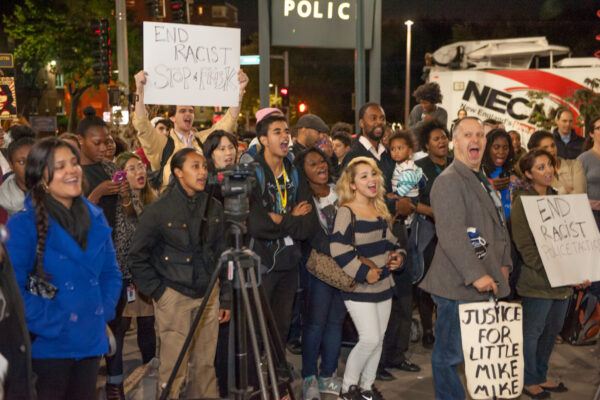On the morning of February 22, 1770, a group of protesters, mostly young men and boys, had gathered outside loyalist merchant Theophilius Lillie's North End, Boston shop. In protest of taxes recently levied by the British Crown, the group had placed an effigy of Lillie on his door with a sign which read "IMPORTER," identifying Lillie as part of the problem because he refused to sign the city's non-importation agreement. Another concerned loyalist, Ebenezer Richardson, attempted to remove the sign, which drew the ire of the crowd. Christopher Snider, age 12 and likely on his way home from school, saw the crowd on this narrow street and joined in.
Richardson retreated to his home several yards away and then verbally accosted some passersby with opprobrious language, which caught the attention of the young protesters in front of Lillie's shop. The young protesters gathered near Richardson's house, at which time he threatened to "fire upon them and swore by GOD that he would make the place too hot for some of them before night, and that he would make a lane through them if they did not go away." The crowd then began to throw rubbish at Richardson, who went inside his home, retrieved a firearm, and fired into the crowd, killing young Christopher. He became the first martyr of the American Revolution.
The impact of the murder of this unarmed child was a spark in the movement to organize, protest, resist, and revolt. His funeral procession from the Tree of Liberty included upwards of two thousand people who "in their countenances and deportment discovered the evident marks of true sorrow." The pall covering his coffin read, among other things "Innocentia nusquam tuta" or "Innocence itself is nowhere safe." Several days later the Boston Massacre would occur, and the American Revolution was born.
On learning of this incident on a recent tour of Boston's famous Freedom Trail, my initial thoughts turned to the questions asked and objections raised in similar incidents today: "Where were his parents?" "Why were these people trying to disrupt a local businessman's enterprise?" "Instead of focusing on the misdeeds of the Crown they should have been doing something about the colonist-on-colonist crime." "If the boy would have pulled up his pants and gone to school this never would have happened."
But it would have happened, according to Dr. Joseph Warren, who conducted Snider's autopsy, because "[n]evertheless, to the persecution and tyranny of his cruel ministry we will not tamely submit -- appealing to Heaven for the justice of our cause, we determine to die or be free." It would have happened because the human spirit has a yearning to be free from oppression, tyranny, injustice, brutality, and the tacit acceptance of these aforementioned affronts to the notion of liberty.
Yet, when we as a nation look upon the uprisings in Ferguson and Baltimore, and the marches in New York and Boston, the narrative denies these people the honorific title of patriots. But that is in fact what they are: patriots, people who love and strongly support or fight for their country. Marchers who have taken to the streets, protesters who have spoken out against the tyranny experienced at the hands of police, activists who have held accountable those who would seek the highest office of this land.
They are inspired by the prophetic tradition to speak truth to power and demand that this country, instead of being consumed with wealth and offering empty platitudes about equality, "let justice roll down like waters and righteousness like an ever-flowing stream." (Amos 5:24) They are patriotic in the same way James Baldwin expressed that "I love America more than any other country in this world, and for this reason I insist on the right to criticize her perpetually."
Unfortunately, these young patriots' expression of love are met with the same response that Ebenezer Richardson had to the young activists gathered outside the shop of an individual who was complicit in perpetuating the subjugation and exploitation of the colonist. Attempts are made to interfere with demonstrations, insults and accusations of disloyalty are hurled towards them, and they are met with violence. This violence comes in the form of tear gas, batons, zip cuffs, and bullets. This violence also comes in the form of facial scanning technology, confidential informants, undercover officers, and video and photographic surveillance.
To innocently embrace the ideas of democracy, freedom, and liberty should not come with the consequence of being brutalized, threatened by a militarized police force, or monitored by your government. To be associated with a group of individuals who exercise their right of free speech, to demand justice and equality, should not result in being included in a counterterrorism intelligence file. The pall of governmental surveillance intended to dismantle efforts of the people to "get free" has cast a dark shadow on the youthful zeal to transform this nation, and as a result, once again, the innocence of patriotism is nowhere safe.
Rahsaan D. Hall is director of the Racial Justice Program at the ACLU of Massachusetts. This blog was originally posted at Huffington Post.
Stay Informed
Sign up to be the first to hear about how to take action.
By completing this form, I agree to receive occasional emails per the terms of the ACLU’s privacy statement.
By completing this form, I agree to receive occasional emails per the terms of the ACLU’s privacy statement.

